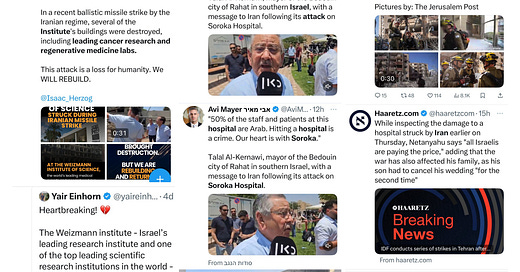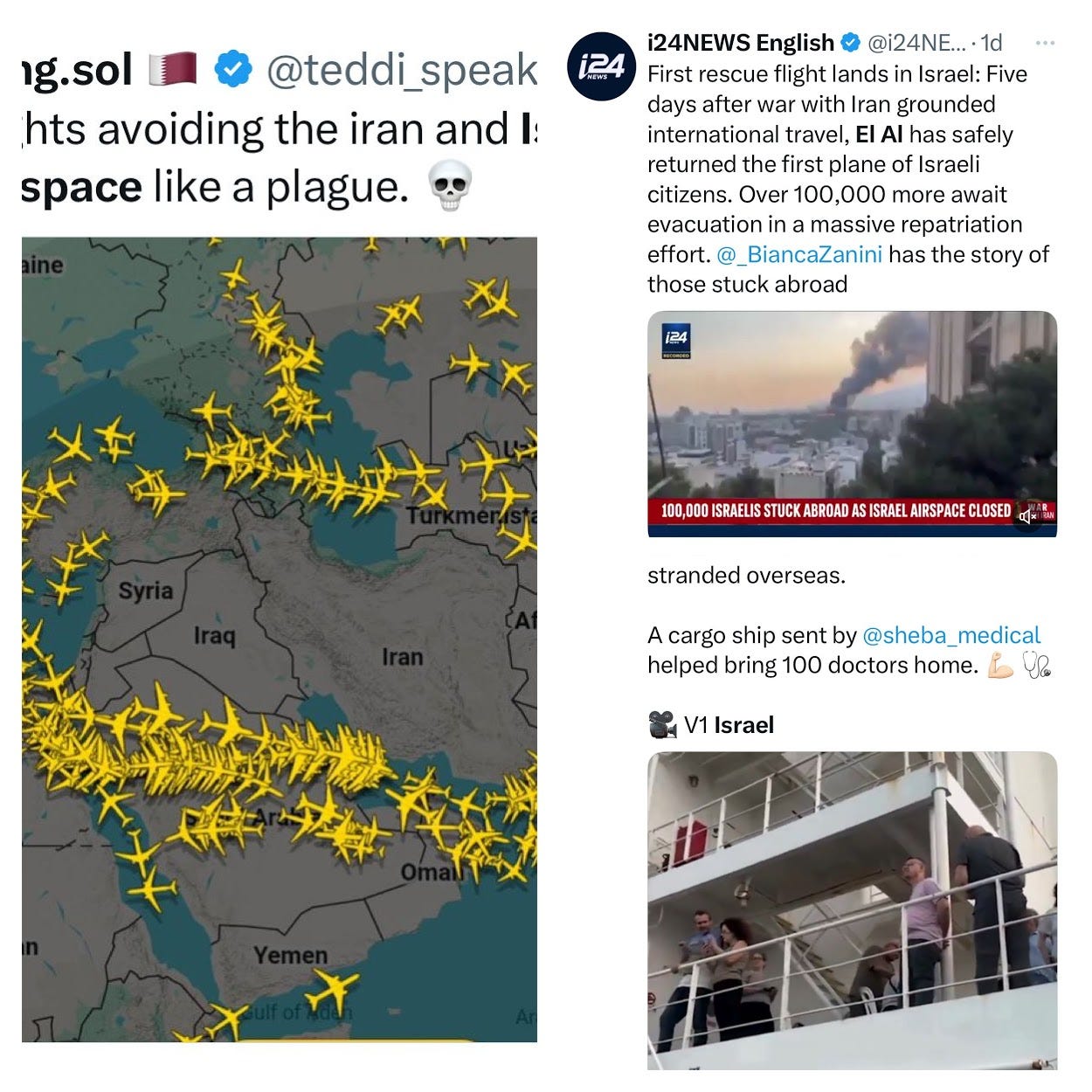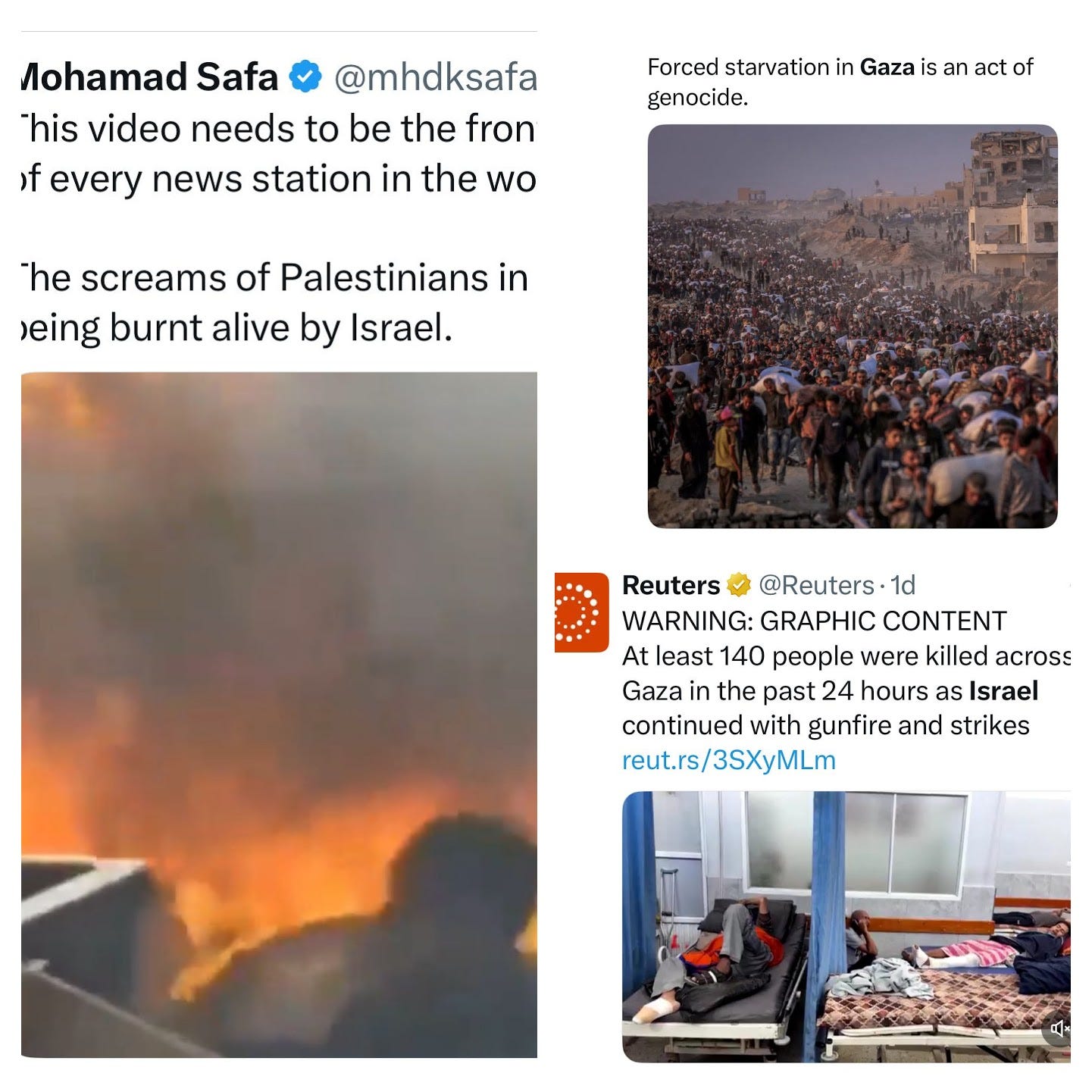Israel at War - Day 622 of Gaza War, Day 8 of Iran War
1. Iran Retaliates, Launching Hundreds of Missiles at Civic Targets in Israel
On Saturday, June 14th, Iran launched multiple missile attacks on Israel, retaliating against IDF operations in Iran. Over 400 missiles were fired within a week; 90% were intercepted, while approximately 30 missiles struck various targets across the country, causing extensive damage to both private and public infrastructure.
At least 24 individuals lost their lives, and more than 800 were injured, with 8 still in critical condition.
The missile strikes spanned the country from the north to the south of Israel. In the north, a missile hit an oil refinery in Haifa Bay, inflicting significant damage, killing three workers and causing the shutdown of the refinery. In Tamra, an Arab village in the Galilee, a missile struck a family home, killing four women, including a mother and her two daughters. Jewish residents of a neighboring community were caught on camera expressing joy and chanting “may your village burn” as the missile hit the family home in Tamra. These fatalities highlighted the urgent need for shelters and safe spaces in Arab communities and underserved Jewish areas nationwide.
In central Israel, residential buildings in Tel Aviv, Ramat Gan, Holon, Rishon LeZion, and Rehovot were targeted. The Weizmann Institute in Rehovot suffered extensive damage, with laboratories and research samples destroyed in the attack.
In the south, Soroka Hospital in Be’er-Sheva, a key medical facility serving the Negev region, was directly hit, damaging the old surgical ward, which had been evacuated the previous day—an action that likely saved lives. The Mayor of the Bedouin town of Rahat near Be’er-Sheva Talal Al Krinawy condemned the Iranian attack on the hospital, where 50% of the staff are Arabs. PM Netanyahu - who visited the hospital a few hours after the attack - was slammed by the media and the public when he said on the site of the hospital hit by a missile: “Each of us bears a personal cost, and my family has not been exempt… This is the second time that my son Avner has cancelled his wedding due to missile threats… I must say that my dear wife is a hero, and she bears a personal cost.”
The hospital attack, along with the strikes on central Israel, occurred shortly after the Home Front authorities eased restrictions, allowing businesses, workplaces, and shopping centers to reopen. A total of 271 people were injured in the Thursday attacks.
All educational institutions, from daycare centers to high schools, remain closed. Academic activities have shifted to remote learning until further notice. Additionally, all matriculation exams have been postponed.
2. Israel Attempting to Destroy Irans Nuclear Infrastructure, and to Shake the Islamic Regime
Early last Friday morning Israel launched an intensive airstrike on Iranian targets in the capital Tehran and other major cities in the country. The Israeli air force also bombed two of the major nuclear facilities in the country at Fordow and Natanz. Iran has built multiple nuclear facilities all over the country. Since last Friday morning the strikes have intensified. Israel has managed to establish total control over the skies above Iran, thereby neutralizing the defensive ability of the Iranians. This has enabled the Israeli attack jets to act freely with no fear of damage.
It is still unclear how much damage the Israeli strikes have made to Irans’ nuclear plans, and if Israel has managed to cause sufficient damage to neutralize Iranian plans to achieve nuclear weapon breakout in the near future. The main nuclear facility was built deep under a rocky area in the country and a very heavy bomb is needed to destroy it. Unfortunately Israel neither has these bombs nor does it have the airplanes to carry them.
In addition, the more success the air operation has had, the bigger Israels appetite has become. In the last few days some senior officials in Israel have started fantasizing that it may add another target to the war with Iran and try to bring down the radical Islamic regime of the Ayatollahs creating regime change. This was not originally defined as an objective of the war with Iran, but it may have been added later, due to the initial success of the operation.
The Israeli Defense Force called on Iranians in Tehran to flee the city to rescue themselves from the deadly attacks. That announcement caused severe traffic jams in the main roads out of the city.
The Iranian nuclear plan which was defined as an existential threat to Israel has been the most important item on PM Netanyahu’s agenda for years. The air strikes continue intensively, targeting other places that Israeli leaders have identified as regime institutions, and also bombed the Islamic university in Tehran. The damages in Iran are significant. PM Netanyahu and Minister of dDefense Israel Katz have threatened Iranian leaders, with Katz issued his strongest threat saying Tehran’s supreme leader “cannot continue to exist,”.
3. Israel Waits For President Trump to Decide If the US Will Join the War and Help Israel Destroy the Iranian Nuclear Infrastructure
President Trump has made diverse statements in the last few days about Iran, but none indicated if the US army will weigh in and join Israel in the war. Before the Israeli strike, the US tried to negotiate an agreement with Iran around its’ nuclear plans. But the negotiations reached a deadend. At the beginning of the Israeli attack, President Trump hoped that the intensive airstrikes will convince Iran to return to the negotiating table, but that did not happen. Later this week, President Trump announced that he will accept nothing less than total surrender by Iran. He later suggested that the US may join Israel. American attack jets were moved to the Middle East, but later they were pulled back. Israel hopes that President Trump will decide to join the war and help it destroy or at least cause significant damage to the main nuclear facility in Fordow. It is believed that Iran was enriching uranium235 to concentrations above 90%, an essential component for a bomb. President Trump has spread conflicting messages about his intentions.
4. Israel Totally Isolated from the Outside World for Days
Israeli airspace was shut down right after the attack on Iran started early Friday morning, due to Iranian missile attacks. All flights in and out of Israel were halted, due to security restrictions imposed by the State. All the Israeli airline companies flew their aircraft to Cyprus. No one was able to enter or exit the country until Wednesday morning. About 200,000 Israelis were stuck all over the world unable to return to Israel. Tens of thousands of tourists and foreign citizens were stuck in Israel, unable to travel. All foreign airlines announced that they have suspended their service to Israel until further notice. Israeli airlines have started to fly into the country on Wednesday morning, but were not allowed to take anybody out of the country, because they stated that they wanted to spend as little time on the ground as possible. The State forbade all Israeli citizens from leaving the country until further notice. Tens of thousands of Israeli citizens are still waiting for a way to get back home, some of them have humanitarian issues to manage. Some traveled by yacht from Cyprus, a trip that was very expensive and cost up to €5,000 per person . Some chose to travel to Amman, Jordan by plane and then take a taxi to the border with Israel, others traveled to Sharm al Sheik in the southern Sinai peninsula and then took a taxi to the border with Israel. All those solutions are not recommended to Israeli citizens due to hostility against Israelis in neighboring countries due to the Gaza war. The estimate is that it will take three weeks to bring all Israelis back home. All flights into Israel are currently operated by Israeli airlines only. The minister of transport, Miri Regev, a member of Likud, PM Netanyahu’s party, consulted with Israeli chief Rabbi who gave a rabbinical edict forbidding El Al from operating flights during the Jewish Sabbath (Saturday). That raised a lot of criticism among many. It was also published that some people with the right influence were able to return first. An Israeli cruise line, Mano Sapanut, has announced plans to start ferrying those who wish to leave Israel for Cyprus. The US, Canadian and other embassies have announced that they are making plans to enable their nationals to leave Israel if they so desire.
5. Dozens of Gazans Killed and Hundreds Injured Near Aid Distribution Compounds
The Israeli and foreign media reported that this week, that more than 140 civilians, including children, were killed and more than 500 injured, in IDF air strikes and tank and artillery fire. Many of them were killed while seeking food and supplies in aid distribution compounds in the Gaza strip.
According to the Hamas controlled health ministry in Gaza, 59 civilians were killed in one incident in Khan Yunis in the south of the Gaza strip, from IDF fire. The IDF issued a statement lamenting the death of “uninvolved” civilians and stating that the IDF will investigate the case.
According to media sources who spoke with Gazan eyewitness accounts, the aid-distribution compounds operated by the Gaza Humanitarian Foundation (GHF) are described as “death traps”, where civilians are risking their lives while seeking food and supplies, as the humanitarian crisis in Gaza continues.











While Israel certainly would prefer a different regime in Tehran, its strategy is still aimed at deterrence, degradation, and disruption of Iran's nuclear capability, not full-scale regime change. To claim otherwise overstates current evidence.